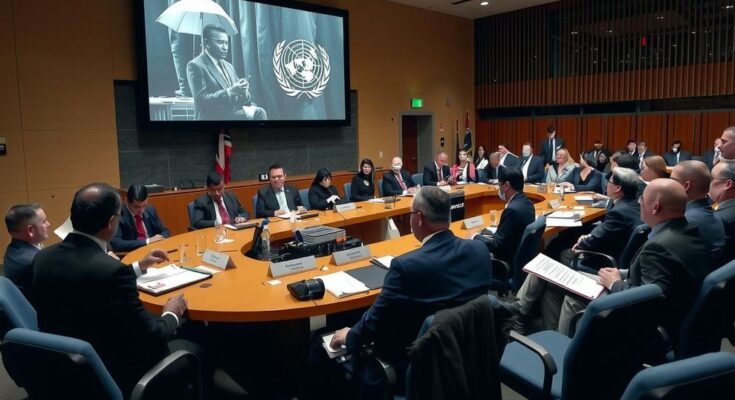At the UN Third Committee, the UK’s Liz Page highlighted the necessity of human rights protections within the newly proposed Convention aimed at countering cybercrime. While acknowledging stakeholder concerns about potential risks, she affirmed that effective safeguards must be implemented and upheld by all parties. The UK’s stance includes strict compliance criteria for international cooperation regarding cybersecurity.
In a statement at the UN Third Committee, Liz Page, the UK’s First Secretary for Cyber, Digital and Technology, emphasized the importance of safeguarding human rights in the context of the Convention on Countering the Use of Information and Communications Technologies for Criminal Purposes. Page recognized valid concerns regarding the Convention’s wide scope and potential threats to individual liberties, urging that effective safeguards be established to ensure compliance with international human rights laws. Page notably referred to Article 24, which mandates that domestic law must include necessary conditions and safeguards to protect human rights during the Convention’s application. She stressed that these obligations are not merely optional; they are fundamental and must be adhered to both domestically and internationally. Yet the statement underscored apprehensions about a few Member States attempting to sidestep these requirements, complicating international cooperation driven by trust and good faith. Furthermore, Page reiterated the UK’s intent to actively monitor the implementation of these safeguards, remaining unwilling to cooperate with any nations that do not meet compliance requirements. The UK also expressed readiness to assist countries respecting these safeguards through capacity-building initiatives. While the commitments of this Convention may be pivotal, it is ultimately the real-world implementation and integrity of State Parties that will dictate its efficacy in combating cybercrime. In closing, Page addressed Vietnam’s offer to host a signing ceremony, voicing concerns about an unprecedented procedural amendment introduced post-negotiation and emphasizing the need for an inclusive approach that fosters stakeholder participation. This statement reaffirms the UK’s commitment to human rights in the digital age, urging global actors to prioritize these values while engaging in international cooperation.
The UK’s statement at the UN Third Committee reflects ongoing discourse regarding the balance between cybersecurity initiatives and human rights protections. In light of increasing cybercrime threats, countries are under pressure to collaborate through legal frameworks that could inadvertently infringe on personal freedoms. The Convention seeks to facilitate the sharing of electronic evidence, but there are significant concerns raised by various stakeholders about privacy violations and state overreach within this context. By focusing on safeguards and obligations tied to human rights, the UK’s position underscores the necessity of ensuring that law enforcement measures do not compromise fundamental freedoms.
The essence of the UK’s statement is a firm commitment to ensuring that human rights remain at the forefront of international cooperation efforts outlined in the new Convention on Cyber Crime. With clear obligations placed upon State Parties to uphold these rights, there is a call for vigilance and good faith in implementation. Ultimately, the success of these efforts relies on collective adherence to safeguarding measures that can genuinely protect individuals even as nations confront the challenges of a digital age.
Original Source: www.gov.uk



